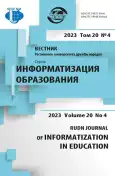The use of video materials in online classes of English for specific purposes
- Authors: Golubeva V.S.1
-
Affiliations:
- Admiral Makarov State University of Maritime and Inland Shipping
- Issue: Vol 20, No 4 (2023)
- Pages: 423-430
- Section: DISTANCE, BLENDED AND FLIPPED LEARNING
- URL: https://journal-vniispk.ru/2312-8631/article/view/321275
- DOI: https://doi.org/10.22363/2312-8631-2023-20-4-423-430
- EDN: https://elibrary.ru/CWWKCO
- ID: 321275
Cite item
Full Text
Abstract
Problem statement . In recent years, the distance format is no longer a rarity and is being actively introduced into the educational process. However, in higher school, when teaching specialised subjects, including English for specific purposes, there is a certain difficulty in making a class dynamic and interesting for students. The use of video materials seems to be one of the ways to solve this problem. The aim of the study - to consider the issues related to the use of videos in classes of English for specific purposes. Methodology . The research covers such topics as advantages of using videos in English language teaching and criteria for their selection as well as preparation of video-related tasks. It also highlights specifics of using news video content as a tool for teaching English. Particular attention is paid to the use of video content in distance learning conditions. The examples of practical experience of using videos in English classes for thirdand fourth-year students studying “Transport Processes Technologies” in Admiral Makarov State Maritime University of Maritime an Inland Shipping in St. Petersburg are given. Results . The use of videos in distance learning classes has a significant number of advantages for students. The practice showed that the most interesting and effective to be used in online classes are newscasts. Conclusion . It is concluded that the process of class preparation using video materials is challenging for teachers, but at the same time that its use has a positive impact on their professional growth and on the effectiveness of the educational process.
About the authors
Varvara S. Golubeva
Admiral Makarov State University of Maritime and Inland Shipping
Author for correspondence.
Email: golubevavs@gumrf.ru
ORCID iD: 0000-0001-9320-1730
senior lecturer, Department of English Language for Navigation and Communication
5/7 Dvinskaya St, Saint-Petersburg, 198035, Russian FederationReferences
- Brevik LM, Gudmundsdottir GB, Lund A, Strømme TA. Transformative agency in teacher education: fostering professional digital competence. Teaching and Teacher Education. 2019;86:102875. http://doi.org/10.1016/j.tate.2019.07.005
- Kovačević D. Creation of online courses in ESP and their use and application in the teaching process. 2020 19th International Symposium INFOTEH-JAHORINA. East Sarajevo, Bosnia and Herzegovina; 2020. p. 1-6. http://doi.org/10.1109/INFOTEH48170.2020.9066346
- Kang N. Flipping student-athletes’ ESP course using teacher-crafted YouTube videos and an OMP strategy. STEM Journal. 2018;19(3):83-108. https://doi.org/10.16875/stem.2018.19.3.83
- Jurkovič V. Maritime English vocabulary in feature films. TESOL Journal. 2016;7(3): 566-590. https://doi.org/10.1002/tesj.220
- Simbolon NE, Febrianti Y. The selection of learning materials from YouTube resources for a Maritime English course. Indonesian Journal of Applied Linguistics. 2020;10(2):460-470. https://doi.org/10.17509/ijal.v10i2.28587
- Brega ON, Bazhutina MM, Kruglakova GV. Video podcast as a thesaurus-based tool for forming the professional second language identity in teaching ESP. Perspectives of Science and Education. 2020;43(1):389-398. http://doi.org/10.32744/pse.2020.1.28
- Ahluwalia G. Students’ perceptions on the use of TED talks for English language learning. Language in India. 2018;18(12):80-86.
- Bianchi F, Marenzi I. Investigating student choices in performing higher-order comprehension tasks using TED talks in LearnWeb. Lingue e Linguaggi. 2016;19:23-40. http://doi.org/10.1285/i22390359v19p23
- Guy R, Marquis G. The flipped classroom: a comparison of student performance using instructional videos and podcasts versus the lecture-based model of instruction. Conference: Issues in Informing Science and Information Technology. 2016;13(1):1-13. https://doi.org/10.28945/3461
- Jurkovič V, Mertelj D. Pedagogical authentic video in ESP classrooms for developing language skills and enriching vocabulary. Scripta Manet. 2015;9(2):15-33.
- Woottipong K. Effect of using video materials in the teaching of listening skills for university students. International Journal of Linguistics. 2014;6(4):200-207. http://doi.org/10.5296/ijl.v6i4.5870
- Heriyanto D. The effectiveness of using YouTube for vocabulary mastery. ETERNAL. English Teaching Journal. 2018;6(1):1-12. https://doi.org/10.26877/eternal.v6i1.2290
- Apriyanti D, Syarif H, Ramadhan S. Video feature making in ESP-based public speaking class. International Journal of Language Education. 2021;5(1):469-476.
- Marenzi I, Kantz D. ESP course design - a multiliteracies approach. IEEE 13th International Conference on Advanced Learning Technologies. Beijing; 2013. p. 221-223. http://doi.org/10.1109/ICALT.2013.69
- Nufus H, Kasim U. A discussion of learning Maritime English by utilizing authentic video in speaking skill. English Educational Journal. 2018;9(4):632-660.
- Ellis R, Shintani N. Exploring language pedagogy through second language acquisition research. London: Routledge; 2014.
- Ҫakir I. The use of video as an audio-visual material in foreign language teaching classroom. The Turkish Online Journal of Educational Technology. 2006;5(4):67-72.
- Alhaj AAM, Albahiri M. Using pedagogic video to enhance English for specific purposes teaching program for Saudi university students. Arab World English Journal Special Issue on CALL. 2020;6:302-317. https://doi.org/10.24093/awej/call6.20
- Radosavlevikj N, Hajrullai H. Using video presentations in ESP classes. Southeast European University Review. 2019;14(1):178-195. http://doi.org/10.2478/seeur-2019-0010
- Webb S. Extensive viewing: language learning through watching television. Language Learning Beyond the Classroom. Routledge; 2015. p. 159-168.
- Watkins J, Wilkins M. Using YouTube in the EFL classroom. Language Education in Asia. 2015;2(1):113-119.
- Nguyen CD, Boers F. The effect of content retelling on vocabulary uptake from a TED Talk. TESOL Quarterly. 2019;53(1):5-29. https://doi.org/10.1002/tesq.441
Supplementary files









